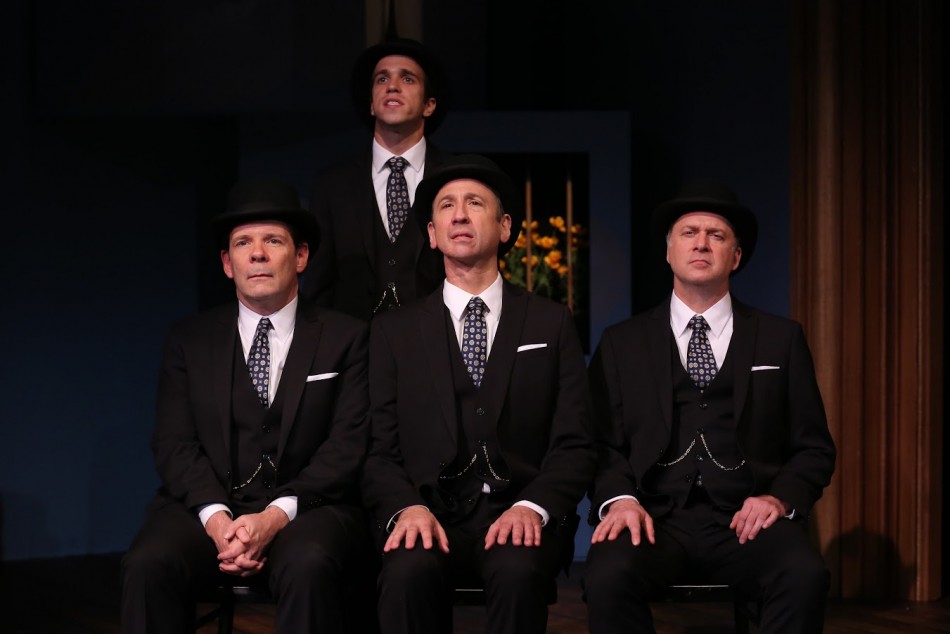Review by Beatrice Williams-Rude
“The Canary” is a splendid work by Steven Carl McCasland about world-renowned soprano Elizabeth Schwarzkopf and her Nazi baggage. It’s a play, history lesson, psychological examination and, in the end, a moral judgment. McCasland has done his homework; the research informs the effort at every level.
“The Canary,” excellently directed by the playwright, is marvelously well cast. Hitler (David Gautschy) looks like every photo we’ve ever seen of him and the subdued acting is in keeping with everything we know about his private life. The same obtains for Goebbels, played with icy élan by Levi Morger. Göring, in a most effective performance by Orlando Iriarte, exhibits déclassé brutishness.
The thread that provides the trajectory of the play is a young academician, Mike Hamilton, deftly played by Brian Piehl, who is doing a dissertation on Schwarzkopf and is attempting to interview her. This is difficult because there are many questions she refuses to answer. We are shown the critical encounters, including the one in which Goebbels arm-twists her into joining the Nazi party. Her father had refused and had suffered for it.
Richard Strauss is hauntingly portrayed by Rick Grossman. Maria Ivogün, a noted soprano and Schwarzkopf’s teacher, is charmingly portrayed by Ellyn Stein. Kirsten Flagstad is well done by Kim Rogers, but the fog of Nazism that surrounded her was not addressed. (She returned to Nazi-occupied Norway during the war leaving the U.S. to do so. She did so even though friends, colleagues and even former President Hoover, pleaded with her not to go. Her husband was an industrialist and Nazi supplier.)
Now to the Wagnerian role of Elizabeth Schwarzkopf, the centerpiece of this work: it is heroically tackled by Anna Kirkland. She splendidly shifts age, from arthritic-seeming in the present to sprightly and agile as she recounts various episodes. The clever costumes by Somie Pak should be noted at this point. She “underdresses” the diva so by shedding a layer, a different body and time frame are instantly achieved.
Kirkland poignantly conveys Schwarzkopf’s anxiety, her omnipresent terror and desire to do nothing but sing even as she recognizes the impossibility of separating herself from the events surrounding her. “The Canary” is the perfect metaphor: to sing in a cage, safely. But through the bars on the cage she sees the trains taking Jews “where,” she asks. She sees the music written by Jews in concentration camps who were subsequently murdered.
Early on she’d asked Goebbels about his job. He tells her it’s to paint a pretty picture of Germany. “But is it honest?” she asks. Goebbels responds by asking if she’d ever received a present she didn’t like, and if so, how did she react. She says she was polite and said she liked it. Goebbles smiles and likens her answer to his job.
Schwarzkopf was having an affair with Goebbels, which was key in advancing her career. Her face is rubbed in it by Maria Ivogün, her teacher and one to whom she still listened. When asked how she could sleep with a man who was committing the atrocities Schwarzkopf now, reluctantly, had to acknowledge, she says, “You go to bed with a man and wake up with a beast.”
Conductor Karl Böhn is very well played—in all senses—by Mathew Martin. The roles of Eva Braun and Schwarzkopf’s assistant are ably handled by Rachel Adams.
Before the production begins, the scene is set by glorious music, including Beethoven piano sonatas, emanating from a record player—said machine is crucial to the plot. I wish we could have heard Schwarzkopf records. While Anna Kirkland is a trained singer, Vissi d’rte, the aria Tosca sings before stabbing a tyrant, was painful to the ear. Her vibrato was really a tremolo and for the first half she was shrill in the extreme. Ultimately she pulled it off, ending triumphantly, but not before causing much aural agony. Her subsequent offerings were less dramatic and more beautiful, particularly the pianissimi passages.
“The Canary” is a compelling work that raises many issues. But how are we, in the comfort and safety of our living rooms, we, who, after a single incident, 9/11, willingly turned ourselves into a surveillance state replete with secret courts, to judge the actions of powerless, terrified individuals confronted with hellish choices?
“The Canary,” is one of five plays by McCasland being done in Repertory at the Clarion Theatre, 309 East 26th Street, in Manhattan. The Festival runs through May 31 and all five offerings are based on historical events and people. Tickets are available at www.clariontheatre.org
So, theater devotees, history buffs, music aficionados, and all those interested in seeing a riveting, thought-provoking production, the Clarion calls.
Photos: Samantha Mercado-Tudda
























